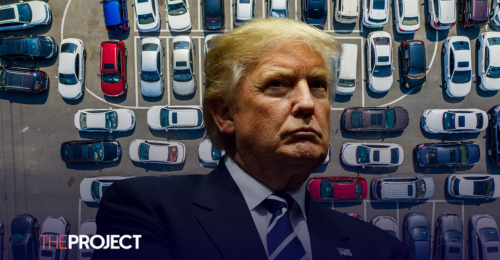The move widening the global trade war he kicked off upon regaining the White House this year in a move auto industry experts expect will drive up prices and stymie production.
"What we're going to be doing is a 25 per cent tariff for all cars that are not made in the United States," Trump said at an event in the Oval Office.
"We start off with a 2.5 per cent base, which is what we're at, and go to 25 per cent."
European Commission President Ursula von der Leyen described the move as "bad for businesses, worse for consumers," while Canadian Prime Minister Mark Carney labelled it a "direct attack" on Canadian workers.
"We will defend our workers, we will defend our companies, we will defend our country, and we will defend it together," Carney told reporters in Ottawa.
The United Auto Workers, long-standing critics of free trade agreements it says have destroyed American jobs, lauded it.
"These tariffs are a major step in the right direction for auto workers and blue-collar communities across the country, and it is now on the automakers, from the Big Three to Volkswagen and beyond, to bring back good union jobs to the US," UAW President Shawn Fain said in a statement.
Trump, who sees tariffs as a tool to raise revenue to offset his promised tax cuts and to revive a long-declining US industrial base, said the new import taxes will go into effect on April 2, the same date he plans to announce reciprocal tariffs aimed at the countries responsible for the bulk of the US trade deficit. Collection of the new auto tariffs would begin on April 3.
Regarding the coming April 2 announcement, Trump indicated the measures may not be the like-for-like levies he has been pledging to impose.
"We're going to make it very lenient," Trump said.
"I think people will be very surprised. It'll be, in many cases, less than the tariff they've been charging for decades."
Trump added the duties announced on Wednesday could be a net neutral or even good for Elon Musk-headed Tesla.
"He has never asked me for a favour," Trump said of Musk.
Shares of US-listed automakers fell on news of the press conference on concerns that tariffs would send shock waves through a global auto industry that is already reeling from uncertainty caused by Trump's rapid-fire tariff threats and occasional reversals.
The US stock market also closed lower on worries over tariffs, which have dogged investors for much of the last month. The benchmark S&P 500 Index fell 1.1 per cent ahead of the press conference, and is down more than four per cent so far in March for its worst monthly performance in nearly a year.
The new vehicle levies were expected to drive costs of cars higher for consumers by thousands of dollars, hitting new vehicle sales and resulting in job losses, since the US automotive industry relies heavily on imported parts, according to the Centre for Automotive Research.
"At a time when cost is the number one concern for American car buyers, US automakers are working to provide a range of affordable vehicles for consumers," Jennifer Safavian, president and CEO of Autos Drive America, a trade group representing foreign automakers, said in a statement.
"The tariffs imposed today will make it more expensive to produce and sell cars in the United States, ultimately leading to higher prices, fewer options for consumers, and fewer manufacturing jobs in the US."
Since taking office on January 20, Trump has announced and delayed tariffs on Canada and Mexico for what he alleges is their role in allowing the opioid fentanyl into the US; set import taxes on goods from China for the same reason; launched hefty duties on imports of steel and aluminium; and has repeatedly touted his plans to announce global reciprocal tariffs on April 2.
The US imported $US474 billion ($A751 billion) worth of vehicle products in 2024, including passenger cars worth $US220 billion. Mexico, Japan, South Korea, Canada and Germany, all close US allies, were the biggest suppliers.
With AAP.





























